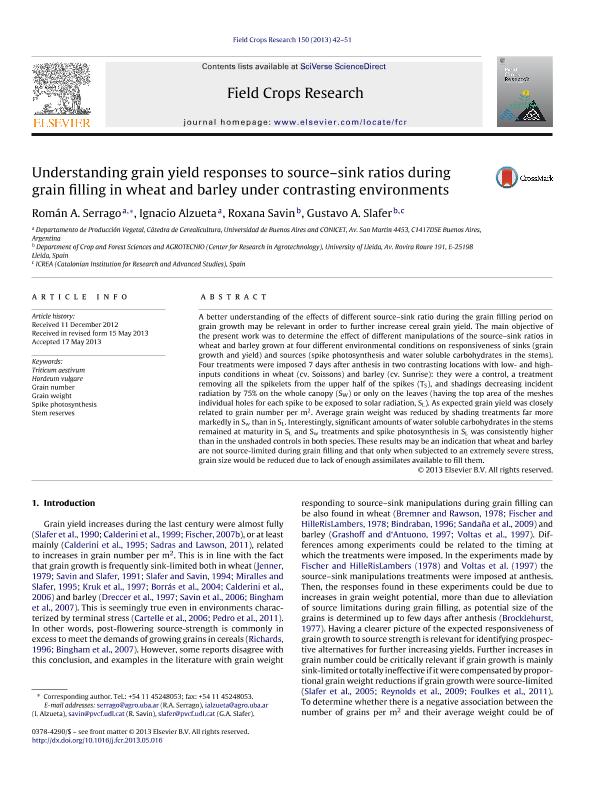Mostrar el registro sencillo del ítem
dc.contributor.author
Serrago, Roman Augusto

dc.contributor.author
Alzueta, Ignacio

dc.contributor.author
Savin, Roxana
dc.contributor.author
Slafer, Gustavo Ariel
dc.date.available
2016-01-12T20:21:00Z
dc.date.issued
2013-08-20
dc.identifier.citation
Serrago, Roman Augusto; Alzueta, Ignacio; Savin, Roxana; Slafer, Gustavo Ariel; Understanding grain yield responses to source-sink ratios during grain filling in wheat and barley under contrasting environments; Elsevier; Field Crops Research; 150; 20-8-2013; 42-51
dc.identifier.issn
0378-4290
dc.identifier.uri
http://hdl.handle.net/11336/3561
dc.description.abstract
A better understanding of the effects of different source?sink ratio during the grain filling period on grain growth may be relevant in order to further increase cereal grain yield. The main objective of the present work was to determine the effect of different manipulations of the source?sink ratios in wheat and barley grown at four different environmental conditions on responsiveness of sinks (grain growth and yield) and sources (spike photosynthesis and water soluble carbohydrates in the stems). Four treatments were imposed 7 days after anthesis in two contrasting locations with low- and high-inputs conditions in wheat (cv. Soissons) and barley (cv. Sunrise): they were a control, a treatment removing all the spikelets from the upper half of the spikes (TS), and shadings decreasing incident radiation by 75% on the whole canopy (SW) or only on the leaves (having the top area of the meshes individual holes for each spike to be exposed to solar radiation, SL). As expected grain yield was closely related to grain number per m2. Average grain weight was reduced by shading treatments far more markedly in Sw than in SL. Interestingly, significant amounts of water soluble carbohydrates in the stems remained at maturity in SL and Sw treatments and spike photosynthesis in SL was consistently higher than in the unshaded controls in both species. These results may be an indication that wheat and barley are not source-limited during grain filling and that only when subjected to an extremely severe stress, grain size would be reduced due to lack of enough assimilates available to fill them.
dc.format
application/pdf
dc.language.iso
eng
dc.publisher
Elsevier

dc.rights
info:eu-repo/semantics/openAccess
dc.rights.uri
https://creativecommons.org/licenses/by-nc-nd/2.5/ar/
dc.subject
Triticum Aestivum
dc.subject
Hordeum Vulgare
dc.subject
Grain Number
dc.subject
Grain Weight
dc.subject
Spike Photosynthesis
dc.subject
Stem Reserves
dc.subject.classification
Agronomía, reproducción y protección de plantas

dc.subject.classification
Agricultura, Silvicultura y Pesca

dc.subject.classification
CIENCIAS AGRÍCOLAS

dc.title
Understanding grain yield responses to source-sink ratios during grain filling in wheat and barley under contrasting environments
dc.type
info:eu-repo/semantics/article
dc.type
info:ar-repo/semantics/artículo
dc.type
info:eu-repo/semantics/publishedVersion
dc.date.updated
2016-03-30 10:35:44.97925-03
dc.journal.volume
150
dc.journal.pagination
42-51
dc.journal.pais
Países Bajos

dc.journal.ciudad
Amsterdam
dc.description.fil
Fil: Serrago, Roman Augusto. Universidad de Buenos Aires. Facultad de Agronomía. Departamento de Producción Vegetal. Cátedra de Cerealicultura; Argentina
dc.description.fil
Fil: Alzueta, Ignacio. Universidad de Buenos Aires. Facultad de Agronomía. Departamento de Producción Vegetal. Cátedra de Cerealicultura; Argentina
dc.description.fil
Fil: Savin, Roxana. Universitat de Lleida. Departament de Producció Vegetal i Ciència Forestal; España. Universitat de Lleida. Agrotecnio; España
dc.description.fil
Fil: Slafer, Gustavo Ariel. Universitat de Lleida. Departament de Producció Vegetal i Ciència Forestal; España. Institució Catalana de Recerca i Estudis Avancats; España. Consejo Nacional de Investigaciones Científicas y Técnicas. Oficina de Coordinación Administrativa Parque Centenario. Instituto de Investigaciones Fisiológicas y Ecológicas Vinculadas a la Agricultura; Argentina
dc.journal.title
Field Crops Research

dc.relation.alternativeid
info:eu-repo/semantics/altIdentifier/doi/http://dx.doi.org/10.1016/j.fcr.2013.05.016
dc.relation.alternativeid
info:eu-repo/semantics/altIdentifier/url/http://www.sciencedirect.com/science/article/pii/S0378429013001986
dc.relation.alternativeid
info:eu-repo/semantics/altIdentifier/issn/0378-4290
Archivos asociados
